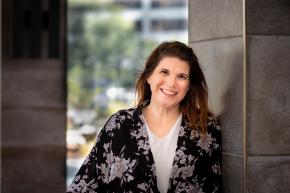December 12, 2019
At Work with Healthier Generation's Social-Emotional Health Team
This post is part of our #HGatWork series, giving you an inside look at the people behind our work and the leaders who further our mission to empower kids to develop lifelong healthy habits.
Meet a few members of Healthier Generation’s social-emotional health content team—the innovative leaders working behind-the-scenes of our new Resilience in School Environments (RISE) Initiative! Presented in partnership with Kaiser Permanente, RISE empowers schools to create safe and supportive learning environments by developing policies and practices that improve the social-emotional health of all students and staff.
When it comes to meeting children’s comprehensive health needs, our RISE team knows that fostering social-emotional health is just as critical as building our physical health through good nutrition and regular physical activity. They also know that learning and teaching social-emotional skills requires patience, practice and the right support.
Read on for a brief introduction to our RISE content managers and learn how they’re taking steps to support their own social-emotional health.
Elizabeth Cook
Senior National Advisor, Social-Emotional Health
Lives, works, and plays in: Madison, WI
What SEL competency is still a work in progress for you? What strategies do you use to improve and why do you think it’s important to develop further?
To be honest, they are all a work in progress for me. On any given day I’m more or less effective at any given one—even those I am ‘good’ at. SEL competencies aren’t a thing to ‘master’ in my opinion. More like something that needs to be regularly attended to and reflected on. Since SEL skills are really about being human, you’re going to naturally ebb and flow within all of them.
I will say the one I consistently ‘yet to have mastered’ is self-management as it relates to the organization of stuff. My mind is a very organized place, but my desk? Not so much. In fact, you can tell where I’ve been by the trail of stuff I leave behind. You know how Hansel and Gretel left a trail of breadcrumbs—well so do I. Except replace breadcrumbs with coffee cup….cell phone…hair tie…notebook…pen….well, you get the idea.
As a busy professional, how do you support your social-emotional health?
This job is a great privilege and when I step outside the everyday business of emails, meetings and deadlines, I am constantly in awe of how it came to be that I am able to do the thing I love (support schools and out of school time sites) with the people I love (educators & public health folks) in a way that allows me to honor my non-work life (aka husband, kids and dog). It took me a while into my career until I was able to step outside in this way—but an intentional practice of trying to do that helps me really maintain perspective and helps me stay balanced, much of the time
And it’s not just me, science says cultivating a sense of awe can help brighten our mood and improve happiness :)
Yasemin Corzo
Content Manager, Social-Emotional Health
Lives, works, and plays in: Los Angeles, CA
What SEL competency is still a work in progress for you? What strategies do you use to improve and why do you think it’s important to develop further?
For me, self-management is the SEL competency that is a work in progress. I really like to make lists – if my workspace is a mess, it’s probably because there is something going on with my discipline or stress. I’ve found that writing down what I’m feeling or thinking helps me identify what is getting in my way. Sometimes it’s a couple of incoherent words, but at least I know what I’m talking about. After that, I can usually set aside some time to regroup and go back to goals that I’ve set. I also like to set the intention of my day and week. I think that it’s important for me to further develop these skills, because I have not typically been successful at a work-life balance. As I’m starting at Healthier Generation, this is one of my priorities.
As a busy professional, how do you support your social-emotional health?
I try to eat a healthy and yummy diet – I love food and all the flavors, spices, and textures that come with food. So, exploration on that front is really fun for my belly, heart, and mind. To boost my self-awareness, I’ve found that working out helps me. Whether a full hike or a few minutes in the pool, I always feel more present in my emotions and self after some physical activity.



